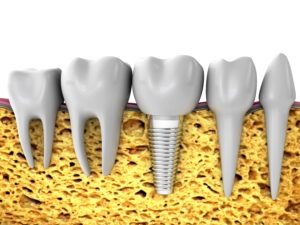
What happens to your mouth if you don’t address tooth loss? The most obvious effects of tooth loss are the way the missing teeth affect your smile’s appearance. Though less obvious, your bite’s function also suffers due to the imbalance. In most cases, a custom-designed bridge, partial, or complete denture can easily address those concerns. However, there are more issues with missing teeth that have a dramatic impact on your long term oral health, and dental implants are the only solution that can address many of the issues. Today, we examine just how dental implants address the loss of permanent teeth, and what makes them more beneficial than traditional prosthetic options.
It throws your bite off balance
A full set of teeth isn’t just attractive; it’s also necessary for your bite to maintain the balance it needs to operate properly. As you bite down, your teeth should meet each other at the same time on all sides of your bite. If they don’t because one or more teeth are missing, then you may develop bite problems such as bruxism and TMJ disorder due to the imbalance. Even a single tooth should be a replaced.
Failure to address tooth loss will make your jawbone weaker
The pressure of your bite also stimulates your teeth roots, which prompts your body to send your jawbone enough nutrients for itself and your teeth. After losing a tooth root, this stimulation is reduced, and your body responds accordingly by reducing the amount of nutrients it sends. Over time, this can cause your jawbone to grow weaker and less dense, increasing your risks of experiencing more tooth loss in the future.
It leads to a host of other dental care issues
Besides bite issues and a weaker jawbone, missing teeth can also leave your other teeth at a higher risk of tooth decay and your gums at an increased risk of gum disease. Both conditions are caused by harmful oral bacteria, which can hide easier in hard-to-reach areas when there are gaps in your smile.
What needs to be addressed with tooth loss?
Besides appearance and bite function, your teeth are also essential for a number of processes among your other oral structures. For instance, the roots of your teeth stimulate your jawbone, which is what prompts your body to send it enough nutrients. Losing teeth roots means losing nutrients for your jawbone, and eventually, your jawbone will grow weaker. By replacing these lost roots, dental implants reestablish that stimulation, preserving your jaw’s strength and integrity and reducing your risks of further tooth loss in the process.
How Dental Implants Work
Dental implants are small posts that can be inserted into your jawbone, which then heals to the surfaces of your implant posts. The process of bone growing and attaching itself to the implant is called osseointegration. Made from biocompatible titanium, the posts are made to become a part of your jawbone to support your dental prosthesis with the same stability as your natural teeth roots. Once your crown, bridge, or denture is secured, your implant restoration will feel as comfortable and secure as your healthy, natural teeth. You can also enjoy a healthier, stronger, and more vibrant smile for life.
Address tooth loss and improve your long term oral health
After experiencing tooth loss due to periodontal disease, you can rebuild your smile and preserve your long term oral health better with the help of dental implants or dental bridges. Bridges can help you smile after tooth loss.
There are common mistakes that are made when planning for implants. It is good to consider a another opinion with any significant treatment. To learn more about implant planning, schedule a consultation by calling us in Lake Forest, IL, at 847-234-0517. We also proudly serve residents of Chicago and all surrounding communities in the Chicago Metro area.
